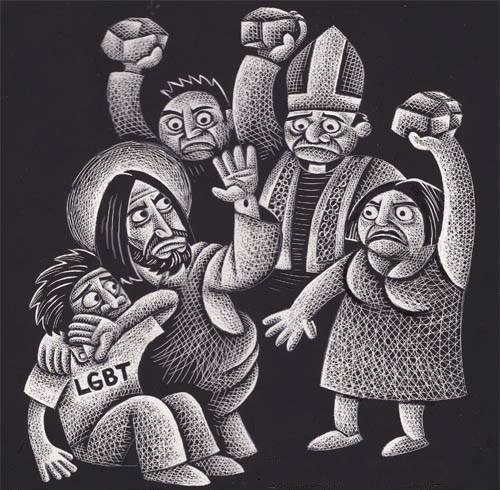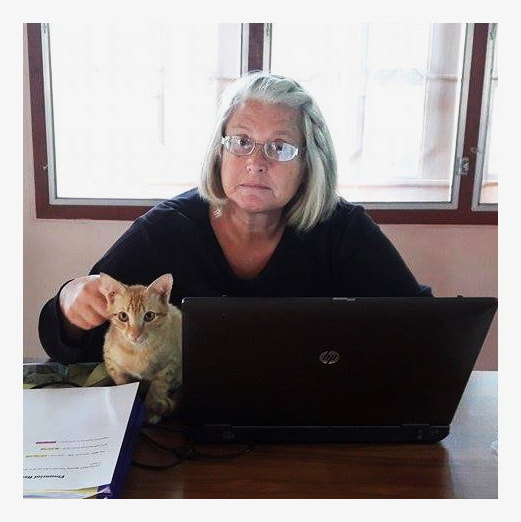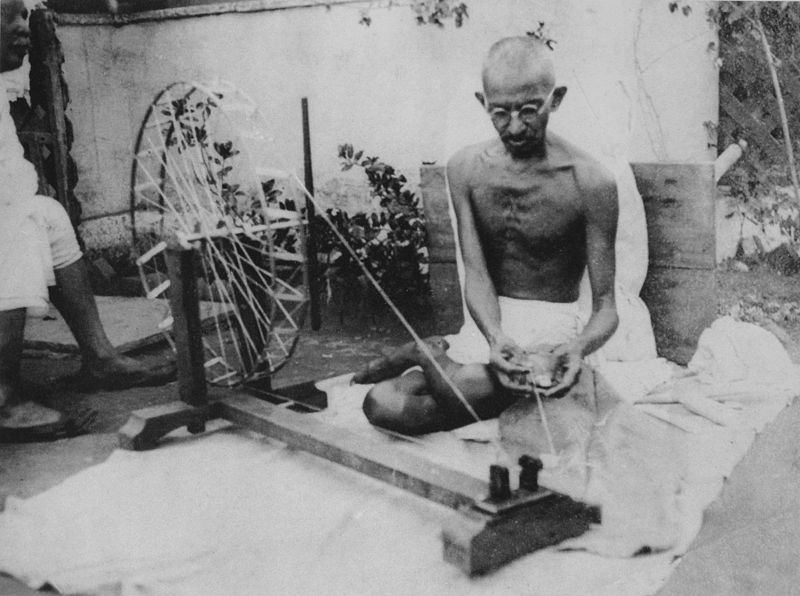|
This week we heard that Pope Francis expressed his pastoral love for a Chilean sex abuse victim who is gay. The fellow said that the Pope told him, “God made you like this and loves you like this and I don’t care. The pope loves you like this. You have to be happy with who you are.” This has electrified a segment of LGBT Christianity who think of it as a reversal of the Roman Catholic Church’s stand.
“God made you the way you are.” Will this declaration resonate and become the mantra that pulses with the heartbeat of the church? Will the theologians, those doctors of things divine, find the will to affirm that “Christ redeems you and loves you the way you are”? Then we shall have the freedom to do great and loving things, for that is what we are made for. Almost those very words liberated me a couple of decades ago, after four decades of hearing nothing really accurate or helpful from the church or its scholars. “God made you like THIS” and not like some other people that are not like this. THIS will not change. Some things are subject to change, but not THIS. The moment I heard that liberating affirmation, I began to try to find out what THIS is and gave up years of fruitless efforts to be otherwise. That was the moment I embarked on becoming happy with “who I am”. I hope the guy from Chile found the sort of exoneration I did. “God loves you like this and I … love you like this. You have to be happy with who you are.” I hope this expression from Pope Francis is accurate and we will not be hearing a rebuttal. I hope this fatherly wish will not be obscured behind walls of interpretation that mean he did not mean to mean it so simply. Alas, just one day later we heard that the pope instructed bishops to be on the lookout for gay guys applying to enter seminaries, and if there is any suspicion at all, to keep them out. The church has more than one voice, even if the voice is the Pope’s. The church always has and always will have collective thoughts about this, as well as dissenting opinions. We have not heard the last of this. Angry objectors are biding their time. But on THIS matter, time’s up. The time has come for the church to shift. The shift will not be into universal consensus, which we are led to believe would be a complete reversal of the church’s previous consensus that sodomy is sin, the worst sin of all, the abomination that is so bad it’s name cannot be spoken and that needs to be cut from the body with a red-hot knife so the hideous tumor can be cast aside and the wound be cauterized. There always was a minority in the church who opposed the inquisition and who knew that being made like THIS was neither God’s mistake nor ours. The shift we seek is toward inclusive love, just enough, for now, to tip the balance. These numbers are rising, and may now include one more relieved soul from Chile. [Credit for this 2013 cartoon goes to Angelo Lopez of the Philippines.]
1 Comment
My friend Dr. Lora Friedrich, Professor Emeritus of Simpson College, observed, “Students these days DECIDE what is true rather than DISCOVER what is true. This is what’s basically wrong with the American Educational system.” What Lora and many other educators have found is that students nowadays think they have the right to make all the decisions about what they do in school and what they are entitled to get out of it. And institutions have yielded to this commercial pressure.
However, the cause is deeper than student entitlement. It is cultural, as mentioned in a famous critique by Isaac Asimov: “There is a cult of ignorance in the United States, and there has always been. The strain of anti-intellectualism has been a constant thread winding its way through our political and cultural life, nurtured by the false notion that democracy means that ‘my ignorance is just as good as your knowledge’.” It is unnecessary to belabor the notion that we have reached the point where the balance may have tipped in the USA away from education, science, and knowledge toward options, entitlement and protection. Nobody is saying that ignorance is good. Not in so many words. The words being used sound more like common sense. I hear people saying, “There is no such thing as scientific facts because there are only theories that will be disproven sooner or later.” “There is a conspiracy by liberals to impose immoral values on the public.” “There is a conspiracy by conservatives to impose Christianity as a political system.” “Every family should have the right to say what their children learn.” There are tropes on-line for every point of view, including, “I have the right to be protected from offensive ideas.” “In order to defend our liberties and our religious convictions we need the right to at least ignore opposing systems of thought.” Education is being bent to conform to this post-modern skepticism about the motivations of those who press for comparative studies. More and more educational systems are adopting single points of view curricula. Students are not taught how to assess knowledge but only what is right. Time is valuable. Life is short. Young minds are vulnerable. Tell the new generation what they need to know to function in our culture and then give them skills to fill roles that are needed. Here I feel I should post a caveat. A better educational system does not pose conflicting points of view merely to show how flawed one of them is. The purpose of comparative religion courses, for example, is neither to show how one religion is obviously superior nor to show that all religions are basically the same. Nor does a valid educational system waste time and resources suggesting specious and indefensible propositions just to “be fair”. There is no point to spend much time on a flat earth theory, or that the Nazi Holocaust is just a hypothesis, or that vaccination for diseases is a conspiracy by pharmaceutical companies, or that people (being deported) are “not people, they’re animals”. A better educational system teaches people how to think, how to subject ideas to critical review, and how to prove and dispute arguments based on verifiable evidence and logic. Much has been said about how expensive such an educational system is. What I want to suggest is how expensive it is to be without a consensus that such a system is preferable. A blog essay needs to be short enough to fit on a page and a half, so I will just give 3 examples of what our anti-intellectual bias is costing. Consider the cost of climate change denial, which is essentially US government policy for the time being. This has caused the USA to be a pariah among nations, which are going ahead without us. Meanwhile, fossil fuel costs are rising and resources are dwindling while better and cheaper power sources are being subjected to obstacles other nations have avoided. Consider the cost of wholly privatized health care, which is how it is working out as a result of political deals made by the US Congress. US health care in this system has slipped out of the ranks for developed nations. The number of personal bankruptcies due to unmet medical costs has skyrocketed. And the cost of medicine is higher than anywhere on earth. Consider the cost of limited access to justice, which results from irrational and inconsistent application of sentences. A high percentage of legal cases and imprisonment comes from prosecution for drug offences, which are treated as medical cases in enlightened countries that are not trying to suppress populations. The cost of incarceration is far greater than the cost of treatment for the condition, and the results of incarceration are far less positive. This I think is the bottom line: the cost of our devaluation of valid education is that the USA is being relegated to the second tier among nations. We have lost the moral authority to be an advocate for international cooperation and mutual welfare, much less the mentor for democracy. We have jeopardized the financial safety of a third of our population now and the entire generation to come. And we are not even getting short-term benefits such as living wages for laborers, value for cost for government services, or better neighborhood environments. We are producing the first generation in American history that will not have it better than their parents This is the 70th year since the assassination of Mahatma Gandhi on January 30, 1948. Shortly before his death Gandhi gave his grandson Arun a list of the acts of violence that people perpetrate on one another. He called them the “Seven Blunders of the World” (a pun on other lists including especially “7 Wonders of the World”). In June 2013, Arun wrote, “This list grew from Gandhi’s search for the roots of violence. He called these acts of passive violence. Preventing these is the best way to prevent oneself or one’s society from reaching a point of violence, he would say.” They have also been called “Seven Social Sins” that if not resisted can destroy both persons and countries.
My question this weekend at the start of the season of college and university commencements during which wise addresses abound is, “Have we learned nothing?” But first, Gandhi’s list of universal blunders that effect violence on those who espouse them: 1.Wealth without work. 2.Pleasure without conscience. 3.Knowledge without character. 4.Commerce without morality. 5.Science without humanity. 6.Worship without sacrifice. 7.Politics without principles. Arun added an eighth: Rights without responsibilities. I submit this list as a possible summer sermon series for colleagues looking for alternatives to another trip down lectionary lane. It is tempting to develop a commentary on how each of those blunders has persisted and metamorphosed in our time. Take “politics without principles” for instance. Today, I simply want to recommend this list and reflect on it as a whole. Gandhi was known as a political activist, in which role he is credited with accomplishing the impossible, defying the British Empire and bringing it to an end, starting with the most precious jewel in the Emperor’s crown, India. Moreover, this was done without the kind of violence such defiance usually provokes. Perhaps it was just time for the Empire to end since its usefulness to Great Britain was ended. But Gandhi was also a philosopher. It was a time in which philosophers were treated as popular figures and accorded attention now reserved for entertainment stars and royalty about to be married. One of the largest crowds in modern France thronged to the funeral of John Paul Sartre. Irascible Bertrand Russell was better known in Great Britain that most movie stars. And revolutionaries were philosophers before their revolutions got out of hand. I’m thinking of Marx, Mao, Ho and Che, but there were others, like Bergson, whose philosophy was poetic and just as effective in transforming the human condition. Philosophers in those days could get heard. Gandhi was not railing against tyrants who do violence in order to perpetuate their tyranny. His list was reflective. He was warning that attempting those blunders is counter-productive. The first victims are those who blunder. They are temptations that lure the unwary with false hope. They are lies that destroy the liars and prevent the very things they promise to provide. They are “the easy way”. What’s more they are the modern way, our way, and feel-good natural. It is shocking also that we who love to pick and choose, do not do that with items on Gandhi’s lift of blunders. We embrace the lot. We do that when we are not paying attention. It’s like our racism and tribalism, it operates when we are not talking about it. When we talk we can be nuanced and erudite. We can make sense. But when we are on to other issues like buying a car, or deciding to vote, or intent on sex, we blunder. Gandhi’s list includes professional references when he mentions such things as commerce, science, politics and worship. Educators, medical researchers, members of legislatures, pastors, and people on welfare and on hospice-care … all occupations are covered. But everything on the list is also a universal human endeavor. It’s not just pastors who blunder into worship without sacrifice, and may not even primarily be pastors. Nor are most who blunder into politics without principles on the public payroll, so do those who refuse to vote responsibly. We all blunder. If we have made any progress in the past 70 years it may be toward understanding that these blunders are not merely sources of potential violence. “Passive violence” is violence. It is permissive and dismissive, permitting systems to operate in these blundering ways leading to devastating consequences, and dismissive of complicated objections in behalf of entitlement and exceptionalism. But I hear voices objecting to those who insist it is their right to be protected from the impact of other people suffering. People with pink pussy caps and rainbow flags are standing up and speaking out. Those voices are a little more audible than they used to be. That might pass for progress. Meanwhile there is bloody violence on every hand, unabated and unrepentant. Arun was redundant, I think, in adding an eighth blunder to the list. The seven blunders his grandfather listed are explicatives. They are aspects of rights without responsibilities. What’s more, they are a comprehensive list for our post-modern era, as one would expect such a list to be from a wise philosopher who concentrated on universal truth while spinning thread. This week we probably lost another LGBT leader. What makes it unusual is that he abdicated, in effect. He felt compelled to proclaim that he thinks his life-long conservative political convictions are falsely understood by “the LGBT community” in such a way that he has to choose between being an LGBT advocate and a supporter of US President Donald Trump. In other words he feels obligated to choose between being consistent with his beliefs and being an advocate for LGBT rights being held by a community that he thinks insists he stand for a whole list of “liberal” issues. Since he cannot pick and choose the issues he wants to advocate, he feels forced to choose between being head of an LGBT advocacy network and being a political conservative “in the Trump era”.
These are key passages from his long message posted this week: I do not support Black Lives Matter; I do not believe in systemic racism, white privilege, safe spaces, intersectionality, reparations or the third wave of feminism. I do not believe in sanctuary cities. I support Brexit, school voucher, nationalism, boarders, equality of opportunity not equality of outcome, rule of law, small government, gun ownership, pro-life, and separation of church and state (rightly understood). I cannot be in the closet [about his political conservatism] any longer simply because I am a gay "activist" and simply because identity politics dictates that I must be liberal or be ostracized from the LGBT group. I choose to be ostracized from the LGBT community, if that's my only choice. He is choosing ostracism, a type of social martyrdom. He is marching bravely into the Internet coliseum singing “Nearer My God to Thee”. What we have here is another gay person who voted for Trump and now wants to ignore the things Trump is doing and defend his vote as from his heart of hearts. One question is how can any gay people willingly vote against their best interests, but the other question is what do they think their best interests are? My first thought was that he is confused and his list of things he supports is quite inconsistent and incompatible with actual issues LGBT groups advocate. But on second thought he may be right, just unclear about how he is right, that he has to choose between “us and them.” I propose the following as thoughts as to what is going on between Liberals and Conservatives in the USA and elsewhere: In many countries (perhaps every country) there is a struggle going on to promote human rights and opportunities for LGBT persons. This has initially been divisive before finding areas and strategies for rapprochement, in those places where that has been accomplished. Particular campaigns have included same-sex marriage and the rights of transsexuals and transgender persons to have their sex identity changed on official documents, as well as the right of same-sex couples to adopt children. Often churches and other religious organizations have been active opponents of these efforts, citing beliefs that the sexual binary is an inviolable law of nature or that males are created superior to females. LGBT rights groups have sought linkages to other human rights groups whenever possible. It is a strategy to produce strength through numbers. Opponents have tried to discredit these groups by focusing on a particular issue in order to divide and defeat them more easily. The divisions between “liberals and conservatives” have basically been about these linkages. My “Ah Ha!” is a realization that we often fail to differentiate between principles and strategies. For example, LGBT advocacy groups have often sought to align themselves with other groups advocating different forms of human rights. Feminist rights, racial rights, sexual rights, immigration rights, healthcare rights – they have a lot in common and advocates can learn from and assist each other. We can march together in a Pride parade or #Me Too rally. But opponents of one of the issues can highlight that and seek to discredit “the whole agenda,” tarring everyone with the same brush. Church groups, having become convinced that abortion is not a human right but a grievous sin, find it easy to lump anyone favoring abortion with those who favor other issues as well. Zionist groups excoriate anyone who advocates human rights for Palestinians and call all with whom they associate anti-Semites. Racists in the USA, feeling threatened by increases in numbers of people of color, have chosen “Confederate Monuments” and battle flags, as a symbolic issue to be used against a wider swath of “dangerous ideas” including controls of any kind on firearms, or homeschooling. The idea is to unhitch one issue from the package the opposition is presumed to advocate in order to quash the opposition. The fallacy, of course, is the failure to notice that advocacy groups try to form alliances without necessarily subscribing to all items on every list some other marchers are hoping to accomplish. When we collapse all those distinct aspirations into a lump with a libelous label other aspects of our logic and rationale begin to collapse, too. Then it is easier to feel like a victim. When we succumb to paranoia, we are lost to our cause. |
AuthorRev. Dr. Kenneth Dobson posts his weekly reflections on this blog. Archives
March 2024
Categories |
| Ken Dobson's Queer Ruminations from Thailand |
|




 RSS Feed
RSS Feed
